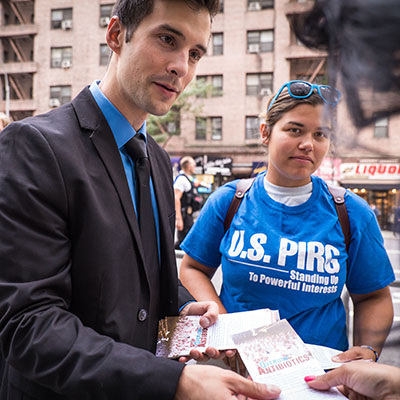Last week another major restaurant took action to protect antibiotics, and a major laggard in the meat industry received a much-needed reality check.
Burger King, the fourth largest restaurant chain in the U.S., and its sister company Tim Horton’s, committed to no longer serve chicken raised on antibiotics important to human medicine. It plans to hit this commitment by the end of 2018 in the U.S. and Canada, according to a Reuters report.
Last December, we commented that Burger King’s efforts to reduce antibiotic use were a step in the right direction, but that they didn’t measure up to actions from other restaurants, including McDonald’s and Subway, to address this issue. The company said that it would eliminate only the use of “critically important” antibiotics in its chicken supply, which sounds good but is too narrow a list of these important medicines.
So does this new commitment measure up? We give a whole hearted, full throated yes. According to the reports, Burger King and Tim Horton’s will eliminate the use of all antibiotics important to human medicine in its chicken supply chain, and that’s a big step forward.
The overuse of antibiotics in both healthcare and agriculture is making these drugs less effective. Antibiotic stewardship programs in hospitals are helping to thwart the spread of drug resistant bacteria, but industrial agriculture—where 70% of medically important antibiotics are sold in the U.S.—continues to misuse and overuse our lifesaving medicines.
In many cases antibiotics are given on a routine basis to animals that aren’t even sick to ward off disease in often unsanitary and crowded conditions. By taking such a shortcut now, meat producers are undermining the efficacy of antibiotics in the long term.
At the annual meeting of the American Society for Microbiology earlier this month, presenters highlighted the shocking speed at which bacteria resistant to a last resort antibiotic, colistin, have spread. Since it was first found in Chinese pigs less than two years ago, the gene that confers resistance to this last ditch antibiotic has emerged in people and animals around the world.
Dr. Lance Price, Director of the Antibiotic Resistance Action Center at the George Washington University, referred to this situation as “one of the clearest examples of how antibiotic use on farms can lead to resistance in human infections.”
With Burger King’s recent move, the top five restaurant chains in the U.S. have now all committed to a strong policy to reduce antibiotic use in their chicken supplies.
The writing is on the wall, but some in the meat industry just refuse to read it.
Sanderson Farms, the third largest chicken producer in the U.S, is one of the last major producers not to take steps to reduce antibiotic use in their production.
In fact, Sanderson has gone in the opposite direction. Its recent marketing campaign presents efforts to reduce antibiotic use as a mere hoodwink. According to one of its television commercials, the phrase “raised without antibiotics” was invented by the “marketing gurus” of Madison Ave to trick people into thinking that the chicken is safer. What’s more, the ads confuse the issue by stating that by federal law all chickens must be clear of antibiotics before they leave the farm.
Where should I start in rebutting that ad campaign? First, the actual presence of antibiotics in the meat itself is not the real issue here. The problem is that when animals are raised with regular, low doses of antibiotics, it can fuel the spread of drug-resistant bacteria. Those potentially dangerous bacteria can then travel off of the farm through numerous pathways into our communities. Health experts including the American Academy of Pediatrics warn that the misuse of antibiotics on farms threatens our health.
Secondly, the joke seems to be on Sanderson. Its attempts to focus consumers’ attention on the presence of actual antibiotics in the meat, rather than how the current production methods breed drug resistant bacteria, may have backfired.
According to a lawsuit recently filed against Sanderson Farms by three non-profits—Friends of the Earth, Center for Food Safety, and the Organic Consumers Association—some of the company’s products did test positive for residues of antibiotics according to inspections by the U.S. Department of Agriculture’s Food Safety and Inspection Service.
According to the lawsuit, here are some tidbits of what USDA found on samples of Sanderson Farms “all natural” chicken (from the Friends of the Earth media release):
- Eleven instances of antibiotics for human use, including chloramphenicol, which is not approved for use in food animals.
- Traces of melengesterol acetate, a growth hormone and ractopamine, a beta agonist. Neither is approved for use in chicken production.
- Six instances of residues of amoxicillin, a medically important antibiotic for human use and one that is not approved for use in poultry. These findings were based on testing methods developed only for beef, because amoxicillin has not been approved for use on poultry.
- Three instances of penicillin residue at up to 0.285 ppb, for which the residue regulatory limit is zero.
- Positive test results for the insecticides abamectin and emamectin, again using testing methods that have not been validated for use on poultry.
When you’re out this week shopping for your July 4th barbecues, you should feel confident that the meat labeled “raised without antibiotics” is produced in a way that does not jeopardize the foundations of modern medicine. It’s not just a hoodwink, or a marketing gimmick. It’s one of our best shots at protecting antibiotics for the future.
And if you can’t recall what the labels mean, just follow this rule: avoid chicken from Sanderson Farms.
